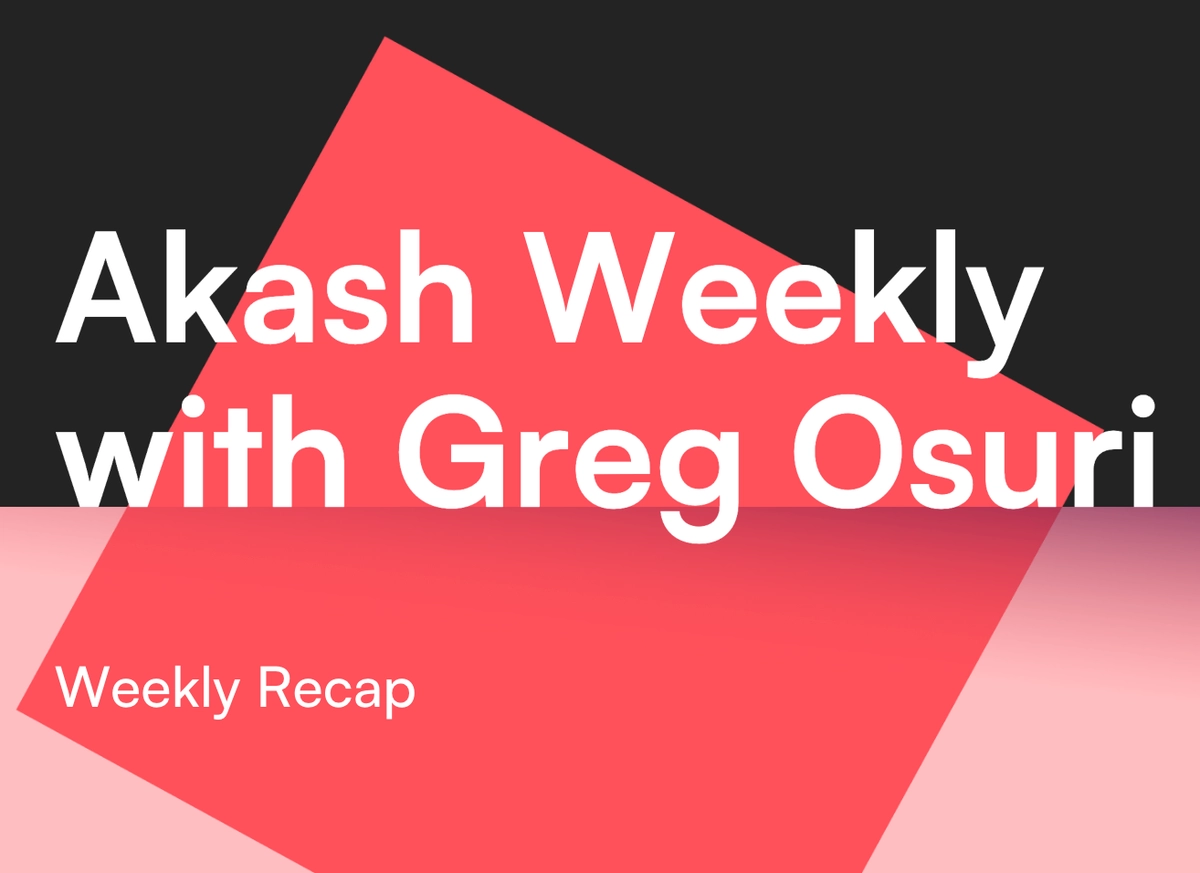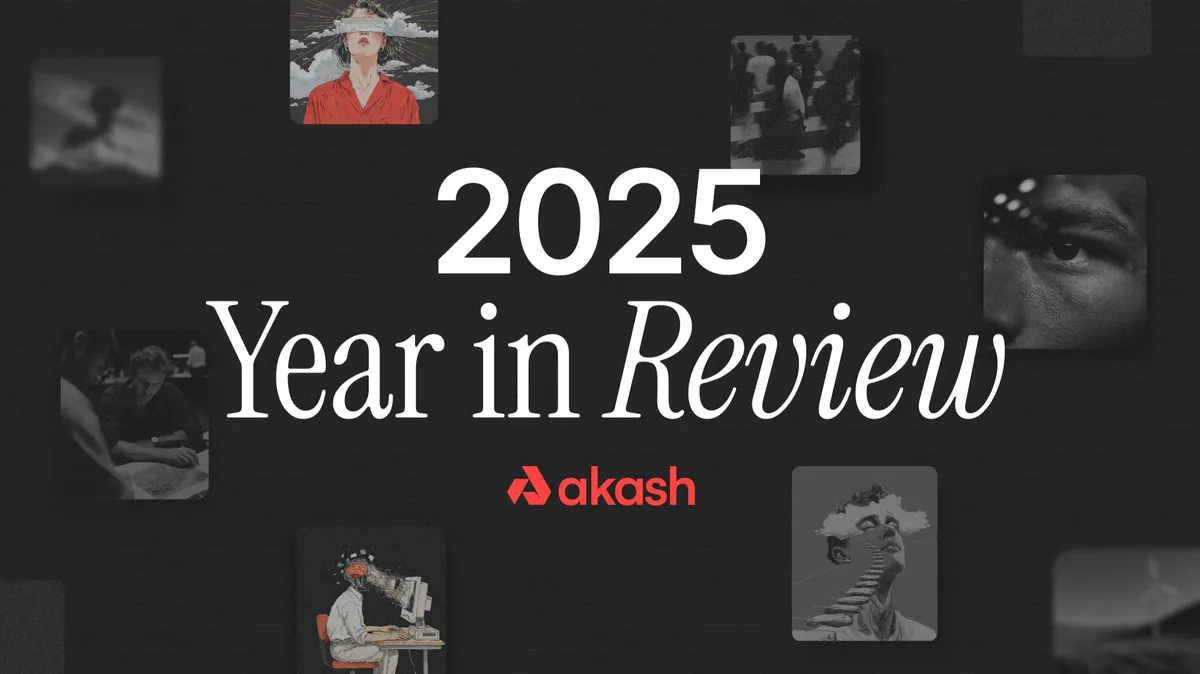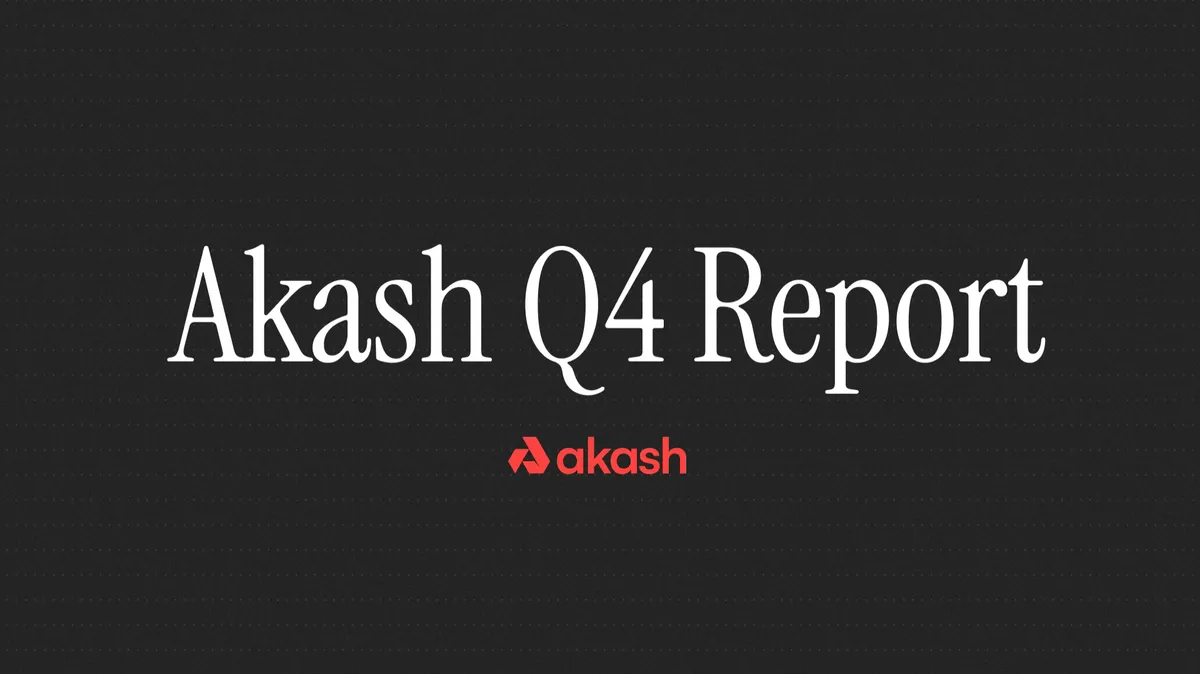
Akash Weekly is our weekly community call hosted on Twitter Spaces. Each week, we cover the latest news and updates from Akash Network with our CEO, Greg Osuri.
Follow Akash Network (@akashnet_) on Twitter to get notifications for all future Akash Weekly events. We’re live every Wednesday at 8 AM PT. Tune in next week for the latest from Akash and conversations with special guests!
Sign up for our newsletter to stay up to date with everything Akash Network.
On this Akash Weekly:
- Greg Osuri - CEO & Co-Founder of Overclock Labs (creators of Akash Network) [Twitter]
- George Jekner, CEO of Yieldmos
- Scott “Hewi” Hewitson, Finance Associate at Overclock Labs
Our topics this week:
- Updates on upcoming Akash events and news.
- The recent exploits of Slope Finance.
- Akash Network’s continued growth and adoption, along with Akash’s Terraform integrations.
- George Jekner gives an overview of Yieldmos, and offers his perspective on web3 adoption and the goal of decentralization.
- Our panel discussed DeFi vs CeFi, security vulnerabilities, and more.
Events & News
Upcoming Events
- Discord Quiz - Every Tuesday. This upcoming Tuesday’s quiz will have a 200 AKT prize pool for five winners.
News
- Akash welcomes our newest Insider, Dimokus! If you are interested in becoming an Akash Insider to get access to the leading edge of the Akash Ecosystem, get more information at akash.network/community.
- Check out our Akash Accelerator program if you have an idea for a project on Akash Network.
- Check out our recent AMA with Citadel.one
Updates from Greg Osuri
Recent Exploit of Slope Finance and The Importance of Open Source

The recent attack on Slope Finance highlights the importance of building open source software. According to reporting from The Block, a group of, “developers, ecosystem teams and security auditors” called @SolanaStatus completed an independent investigation of the attack, tweeting:
“This exploit was isolated to one wallet on Solana, and hardware wallets used by Slope [Finance] remain secure. While the details of exactly how this occurred are still under investigation, but private key information was inadvertently transmitted to an application monitoring service.” [@SolanaStatus]
Akash Network is open source, and we believe strongly in open source development—which creates trust and confidence for Akash users.
Anyone using a hot wallet should verify that the underlying code is open source. Closed source wallets present significant risks to users, and are especially vulnerable to hacks and exploits—as we have seen in the case of Slope Finance.
Decentralized Cloud Adoption and Akash’s Organic Growth
Akash Network was recently featured in an article from Rachel Wolfson at CoinTelegraph on the adoption of decentralized web services for web3. The piece focuses on the current state of the centralized internet, specifically on the dominance of the three largest cloud providers. Wolfson points to decentralized storage protocols like Filecoin and Storj, and of course, decentralized compute marketplaces like Akash Network as leading examples of web3 infrastructure.
In addition, Colin Pape, the CEO of Presearch, a decentralized search engine, highlighted that nodes on Presearch’s network could be run using Akash. In addition, Pape mentioned that Presearch encourages nodes to be run on as many different platforms as possible to encourage decentralization, which is in line with Akash’s ethos and functionality. Presearch currently has 70,000 nodes supporting its network.
We believe that bear markets are an excellent time to educate the market on the importance of decentralized infrastructure. Our message stands out as signal when the noise of token prices and NFT floors calms down. This is the time to speak clearly to long-term market participants—the folks who are building in web3 for a decentralized future. We look forward to more features in the press and the healthy, organic adoption that it will bring.
Terraform Integration
Terraform is the number one orchestrator for multi-cloud applications. Terraform makes it simple to deploy applications across different cloud providers. A new community-created Akash integration with Terraform makes it easy for developers to write a small script to move some of their resources over to Akash Network, which allows them to test Akash without the need to make an all-or-nothing decision. This is important for our business development efforts when we reach out to web2 developers.
We want to thank our incredible community for their continued development efforts and commitment to Akash Network.
Cosmos IBC Relayers
Inter-Blockchain Communication (IBC) protocol on Cosmos works by relaying packets of information between blockchains, without taking custody of user assets. In this way, the security of the transfer is based on the security of the underlying blockchains. Relayers are not vulnerable to the same kinds of attacks and exploits that can happen with bridges.
Our Guest this Week: George Jekner, CEO of Yieldmos
George Jekner is the CEO of Yieldmos, primarily responsible for strategy and back-end development. George has been a crypto enthusiast and a full-stack developer in the traditional finance sector for almost a decade. George was previously an IT consultant in the Chicagoland area for seven years.
Yieldmos provides a way for users to earn yield while maintaining custody of their funds. This is achieved by using AuthZ to delegate specific permissions so that Yieldmos can act on a user’s behalf, but critically, Yieldmos does not take custody of user funds.
George offers an analogy to the way that a check works in the traditional finance system. A check grants a person permission to draw an exact amount of money from an account. In the same way, Yieldmos operates with specific permissions which are granted via AuthZ by the user—this way, users can earn yield while maintaining custody of their funds.
Our Panel this Week: Greg Osuri, George Jekner, and Scott “Hewi” Hewitson
What is DeFi?
Hewi offers a definition of Decentralized Finance (DeFi): “Access to financial products without a trusted third-party.”
Contrasting DeFi against Centralized Finance (CeFi), the panel notes that DeFi products have continued functioning well despite the recent collapses of multiple centralized entities adjacent to the DeFi space—notably Voyager, Celsius, and 3AC.
Greg notes that this is a classic example of closed source failing to open source. DeFi protocols offer transparency that CeFi cannot. In DeFi, a user can see how their funds are being transferred. On-chain transactions allow the users and the wider industry to examine how a protocol is functioning. In this way, openness and transparency can put a check on bad actors and help to mitigate the risks of overleverage.
The panel agrees that DeFi is doing very well in terms of protecting users.
What is the importance of web3 protocols running on decentralized services?
George Jekner offers his perspective on the current state of decentralization in web3. He notes that Yieldmos is striving to move fully into web3 but currently must use some web2 services to access the full tech stack they need. At the moment, web2 is a stepping stone to web3.
Greg’s perspective is that the primary issue is the overreliance on a single host. Relying on the largest cloud providers causes too much concentration of power. web3 companies and protocols should avoid running their applications on these massive cloud providers.
Akash offers high security and high flexibility for developers - all within a decentralized environment.
Q&A from the Community
Is there an ETA on Take Fees?
We are waiting for more regulatory clarity.
Does the protocol have a treasury?
Overclock Labs (the creators of Akash Network) does have a treasury.
Will AKT tokenomics change?
One of our goals is to add stable settlement, as AKT is volatile. This applies especially to people looking for long-term hosting.
We are working to add a stable settlement mechanism using dynamic pricing. We are also working on early provider incentives to grow Akash Network. Stay tuned.
Is Keplr secure?
Keplr is closed source, so Greg recommends the same best practices for security that a person would use with any wallet. Always move funds to a cold wallet for greater security.
Where kind we find a list of Akash Accelerator projects?
This page on our website lists our current accelerator projects.
Is there a plan for an APR boost?
There is no plan for an APR boost.
Connect with Akash
Follow Akash Network (@akashnet_) on Twitter to stay up to date with Akash Network, AKT, and the Akash Community.
Join our Discord to get involved with our community.
Are you an Akash super user? Consider joining our Akash Insiders community to get access to the leading edge of the Akash ecosystem, and be among the first to see and test new features before anyone else.
Join our team
We currently have an opening for a VP of Marketing, and we are always looking for engineers. If you or someone you know is interested, check out our careers page to see current openings.


